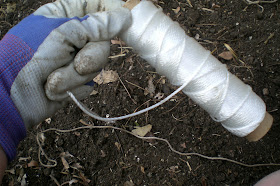Square-Foot gardens appeal to many of us who love some organization in our plantings. Marked off in square-foot sections, the garden is a visual grid for growing a variety of crops, one in each section.
In 2006, my husband and I built four wood raised-bed square-foot gardens, and I came up with this system for marking the grids. The twines, stretched for spring planting and loosened for the winter, are still in good shape after five years.
For each 4' x 4' raised bed you will need a tape measure and pencil, one long nail and a hammer (to start every screw hole), 12 11/4"-long wood screws, a screwdriver (even better is a power screwdriver), and approximately 28' of twisted nylon mason-line twine.
On each side of the wood frame, measure and mark three one-foot intervals with the pencil.
Inside the wood frame and at a downward angle, aligned with each mark, pound a nail into the wood 1/4" deep and about 1" down from the top of the frame. (I need this because I'm not too swift with the electric screwdriver and the screw quickly escapes! Maybe you won't need the starter hole.) Pull out the nail and screw the wood screw into the hole, leaving the head protruding 1/8" from the wood. Do this for all 12 marks in the frame.
Cut the twine into six 54" lengths. Make a slip knot in one end of a length. Hook this loop over one screw head and stretch it to the matching screw on the opposite side of the frame. Make another slip knot at this end of the twine, forming it so the twine will have to stretch taut, and hook it over the screw head. Working from the first side, attach twine to the other two screws. Move to an adjacent side and stretch the remaining three lengths of twine to their opposite sides.
Now you're ready to plant seeds according to their recommended distance within each square. Later, when they're no longer needed, unhook one end of each stretched twine, roll it up and tuck it into the dirt below its first screw.
With this one-time set up, your perennial twine will grid your garden for many springs to come!





